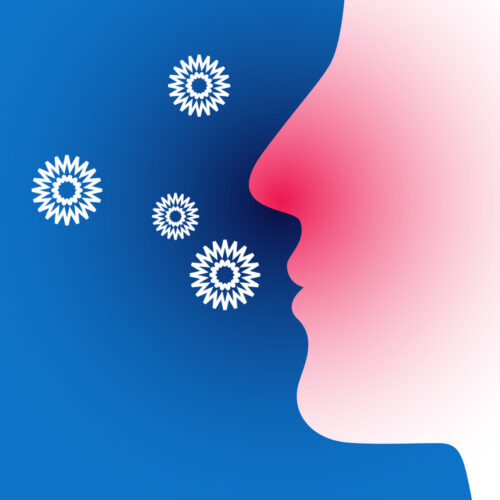What is an Allergy?
An allergy is a reaction of the immune system to substances the body identifies as harmful.
This reaction is more commonly known as an “allergic reaction,” and the substances that cause it are called “allergens.” These allergens can include pollen and dust mites, insect bites and stings, pet dander, and foods such as shellfish and peanuts.
Allergic reaction symptoms can be extremely uncomfortable. They can vary from a runny nose and itchy watery eyes to respiratory problems, hives, and in some cases, can be life threatening if left untreated.
Allergies can be hereditary. If one parent has any type of allergies, the chances are 1 in 3 that each child will have an allergy. If both parents have allergies, it is more likely that their children will have allergies.

Managing Allergies
Various treatment programs are accessible today to effectively manage allergies, offering an improved quality of life.
If you suspect you're experiencing allergies with recurring symptoms, promptly reach out to your primary care physician.
Upon confirmation of susceptibility to environmental allergens by your doctor, inquire about the possibility of undergoing immunotherapy. This proven method works by desensitizing the body, addressing the root cause rather than merely alleviating symptoms.
Immunotherapy stands out as the sole therapeutic approach for allergic conditions capable of achieving a complete resolution of symptoms without reliance on medications. Additionally, when administered to children, it may even prevent the development of further allergic diseases.
Allergy Chat
Dr. Ryan Sullivan, MD, Medical Director - Allergy Services of America, LLC
Ryan Sullivan is a board-certified allergist and a member of both the American Academy of Allergy, Asthma, and Immunology and the American College of Allergy, Asthma, and Immunology. In this video, Dr. Sullivan explores topics related to allergies, including testing procedures, and discusses the range of treatment options accessible to individuals with allergic conditions.
Who Suffers From Allergies?
Allergies stand out as the most prevalent and often undiagnosed health conditions. With over 50 million Americans suffering with allergies, they pose a widespread health concern. Over 55% of the entire U.S. population tests positive for one or more allergens. Despite their prevalence, allergies frequently go undiagnosed, leading to unaddressed health issues.
The impact of allergies extends beyond mere statistics, affecting individuals' daily lives and overall well-being. Recognizing the significance of allergy diagnosis and management is crucial in addressing this pervasive health challenge.
Allergy Testing
Allergy testing is a diagnostic procedure designed to identify specific allergens triggering adverse reactions in individuals. Common methods include skin tests, where allergens are applied to the skin's surface, and blood tests measuring antibody levels.
These tests help pinpoint allergies to substances like pollen, pet dander, or certain foods. Accurate allergy identification guides effective treatment plans, allowing individuals to manage symptoms and avoid potential allergens. Consultation with a healthcare professional is crucial for proper testing and interpretation of results.
Allergy Treatment Options
Once your allergies are diagnosed through testing, your doctor may recommend a treatment tailored to your needs. Two common options are Subcutaneous Immunotherapy (SCIT) and Sublingual Immunotherapy (SLIT).
SCIT involves injections beneath the skin to desensitize the immune system, while SLIT utilizes under-the-tongue allergy drops for a similar purpose.
Your physician will determine the most suitable treatment based on your specific allergies and medical history.


